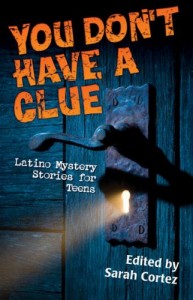A year ago my friend René Saldaña, Jr. published an article in The ALAN Review about the need for more genre fiction for young readers, particularly mysteries, featuring Latino characters and settings. Given the long and lively tradition of detective fiction written by Latin American and Latino authors for adult readers, one would think of this as a big trend among writers for young people as well.
 Saldaña, the author of the bilingual Mickey Rangel mystery series for younger middle grade readers, is one of 18 Latino authors whose work is included in You Don’t Have a Clue, edited by Sarah Cortez and published by the Piñata Books imprint of Arte Público Press at the end of 2011. Saldaña’s story, “The Right Size,” is in fact more of a thriller, in which a 14-year-old boy watches his ordinarily meek father fend off a drug gang that has invaded their home looking for the boy’s older brother. In all, this is a diverse collection in terms of subject matter, contributors, and blending genres, and serves as a superb introduction to the work of notable Latino storytellers and poets who write for children and adults.
Saldaña, the author of the bilingual Mickey Rangel mystery series for younger middle grade readers, is one of 18 Latino authors whose work is included in You Don’t Have a Clue, edited by Sarah Cortez and published by the Piñata Books imprint of Arte Público Press at the end of 2011. Saldaña’s story, “The Right Size,” is in fact more of a thriller, in which a 14-year-old boy watches his ordinarily meek father fend off a drug gang that has invaded their home looking for the boy’s older brother. In all, this is a diverse collection in terms of subject matter, contributors, and blending genres, and serves as a superb introduction to the work of notable Latino storytellers and poets who write for children and adults.
The anthology begins with two stories in the popular paranormal genre, Mario Acevedo’s “No Soy Loco” and Patricia S. Carrillo’s “No One Remembers.” (Interestingly, beginning with the paranormal was completely by chance, as the stories are arranged alphabetically by author surname.) From there, readers are treated to a work of historical fiction, the anthology editor’s own “For You, Mother,” the story of a teenage boy rendered an orphan by Pancho Villa’s army at the time of the Mexican Revolution, who then joins Villa in order to one day wreak his revenge.
Another accidental, but interesting, pairing is Chema Guijarro’s “As the Flames Rose” and Carlos Hernandez’s “Losing Face.” Set in different places—a Mexican-American community in Texas and a Puerto Rican neighborhood in the Bronx, respectively—the two feature talented teenagers who also confront disabilities. In Guijarro’s story, Chuequito has lost his hearing after a rival gang beat him to send a message to his older brother, who is now in prison for sending a message back. In one year, the 17-year-old has learned sign language and caught up in his schoolwork in a deaf school, but an arrest for graffiti threatens his educational aspirations and exposes a long-kept family secret. In “Losing Face,” the intellectually gifted narrator tries to prove his classmate and best friend innocent in the alleged disappearance of the friend’s girlfriend; the story revolves around the friend’s face blindness, the result of a child abuse-related injury years earlier.
Engaging teenage characters, ample humor, intrigue, and surprises make this an engaging anthology for both young adult and adult readers. We can only hope that You Don’t Have a Clue helps build the case for more—and more diverse—mysteries for young readers.